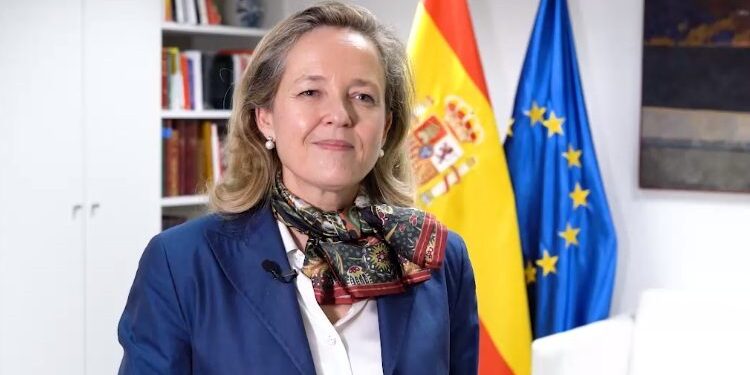The Diplomat
The First Vice President and Minister of Economic Affairs, Nadia Calviño, assured yesterday to the mission of MEPs for the control of the recovery funds of the European Union, which is from yesterday in Madrid, that the Government maintains a “rigorous system of control and transparency” in the management of the funds and that the autonomous communities participated in the design of the Recovery Plan since its approval in July 2021.
The mission, led by the chair of the European Parliament’s Budgetary Control Committee, Monika Hohlmeier (EPP, Germany), arrived yesterday in Madrid for a three-day visit to assess on the ground the implementation of the National Recovery and Resilience Plan, including the fulfillment of milestones and targets, and in particular the management, audit and control systems in place. Spain was the first Member State to receive a payment from the NextGenerationEU Fund in 2021.
The delegation is made up of ten MEPs from various political groups, six of whom are attached to the aforementioned European Parliament committee. Upon their return to Brussels, the delegation will prepare a report. Hohlmeier is accompanied by MEPs Isabel García and Eider Gariazabal (PSOE), Isabel Benjumea (PP), Eva María Poptcheva and Susana Solís (Cs), Ernest Urtasun (En Comú Podem) and Jorge Buxadé (Vox).
Calviño received yesterday the members of the mission, before whom she assured that the Government maintains a “rigorous system of control and transparency” in the management of European funds, according to sources from the Ministry of Economic Affairs quoted by the Efe agency. During the meeting, which was “cordial and constructive”, the vice-president reported in detail on the use of European funds and on the participation and co-governance of the autonomous communities in the design of the Recovery Plan since its approval in July 2021.
Hours earlier, Nadia Calviño assured RTVE that Spain had based its Recovery Plan “on dialogue, transparency and joint work” and that the Spanish Government “has every interest” in an “objective and technical” analysis by the EU of the use of the funds, because Spain “is doing well”. However, she admitted, “the important participation of MEPs from the PP and Vox is a bit surprising”.
She also stated that it is “normal” that Brussels “looks very carefully” at Spain because it has been “one of the first” countries to receive the funds and one of the most benefited. “We are being the guinea pigs. Everything that is tested in Spain is then applied to the rest of the countries, and that is why we are receiving this mission from the European Parliament and why the Commission has been particularly demanding with all the control issues. But it is in our interest that these funds are used to the maximum”, she added.
For this reason, Calviño assured that Spain “has insisted a lot” that the European delegation visit some of the projects to which the European funds have been destined, in order to verify their use “on the ground”. For this reason, and at the proposal of the Spanish government, the MEPs will visit a project financed by the National Recovery Plan, the National Neurotechnology Center.
Community of Madrid and CEOE
The agenda of the MEPs also includes meetings with the Minister of Finance and Public Function, María Jesús Montero, and the Minister of Inclusion, Social Security and Migration, José Luis Escrivá, and interviews with regional councilors of Castilla-La Mancha, Madrid, Extremadura, Andalusia and Aragón and with representatives of employers and trade unions, the digital industry, consultancy and investigative journalists.
After one of these meetings, the president of the Community of Madrid, Isabel Díaz Ayuso, declared that the regional government had told the European Union “the truth” about the recovery funds with the central government and that there is “zero cooperation, zero transparency and zero information”. In response to these criticisms, the Ministry of Economic Affairs assured that the process of consultation and co-governance on the European funds has been “just as intense” with Madrid as with the rest of the autonomous communities and that the region has been one of the most advanced autonomous communities in the execution of the investments. For its part, the Government of Andalusia requested that the communities participate in the design and management of the funds with a model of “real co-governance”, in order to gain efficiency in the measures.
For his part, the secretary general of the Spanish Confederation of Business Organizations (CEOE), José Alberto González-Ruiz, raised with the MEPs the need to make access to and management of European recovery funds more flexible and flexible.







